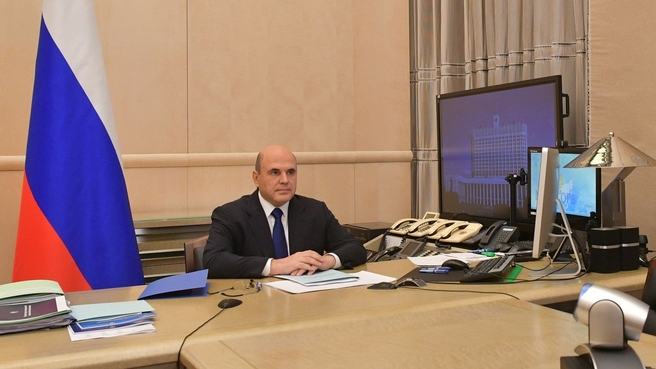Agenda: Plans for the digital transformation of the social sector – a centralised digital platform, a unified call centre for interaction with citizens, an electronic personnel file management system, the Work in Russia platform, digital transformation of the manufacturing sector, and a comprehensive development of Sochi.
Mikhail Mishustin’s opening remarks:
Good afternoon, colleagues.
Modern technologies and digital solutions must be actively introduced in all economic sectors. This is one of the national development goals, which have been approved by the President. The Government has approved two strategic paths in this sphere.
One concerns the digital transformation of the social sector. Its main goal is to improve the system of social support and labour relations through the use of artificial intelligence and the technology of big data analysis and processing. Government assistance must be more targeted and proactive, so that people receive it quickly and conveniently, without unnecessary red tape or numerous appeals to departments.
With this aim in view, we must implement four projects within 10 years. First of all, we must create an Integrated Centralised Digital Platform for the social sector. It will help us to promptly and easily provide people with the support they are entitled to, depending on their circumstances and with the use of social treasury principles. They will not have to provide any background information or documents in paper form. This will mean that in three years’ time, some 80 percent of applicants will be able to receive federal support proactively or by submitting applications.
In addition to this, we will improve feedback mechanisms in the sphere of social support and the allocation of assistance. The importance of this work has been mentioned by the President. Towards this end, we will launch a unified call centre for interaction with people, where they will be able to get all the necessary information.
Another project has to do with an electronic personnel file management system. It provides for the digitalisation of employment relations documents. This will benefit employers by simplifying all personnel matters and offering new opportunities for the development of remote employment.
To make job hunting more convenient for potential employees, we will launch the modernisation of the state employment service. All the relevant services will be available at the Work in Russia platform. Modern technology will be used efficiently to help the applicants to find suitable vacancies and the companies to find the professionals they need.
Overall, these solutions will make the operation of the social sector more efficient and equitable, and it will become easier for people to obtain the necessary support and assistance.
And now I will say a few words about the second strategic sphere of the digital transformation, which concerns manufacturing.
The countries that are first to digitalise industry will become technological leaders. We have the necessary conditions for this. Within the next few years, we will implement four projects aimed at the innovative development of the manufacturing sector.
A large-scale digital transformation will be focused on the introduction of Russian IT solutions at our enterprises. With this aim in view, we will increase the funding of national industrial software projects fourfold. They include the technologies of the internet of things, artificial intelligence, robotics and sensorics, and virtual and augmented reality. Their implementation will help us to enhance labour efficiency, cut prime costs and accelerate commercialisation.
By the end of this decade, we must increase the share of domestically made electronic components for the digital transformation of our industries to over 40 percent.
To maintain the competitiveness of production, we must not only go digital but also organise work on the “good-fast-cheap” principle. Our products must also be tailored to the clients’ requirements. We believe that at least 70 percent of our high-tech products will satisfy these requirements by the end of the decade.
The next issue concerns the modernisation of the holiday destination infrastructure and the creation of comfortable conditions for holidaymakers, investors and local residents, who live and work in these areas all year round. The President has pointed out the importance of doing this.
A Government directive has been signed to launch the comprehensive development of Sochi. We have coordinated a list of priority projects. There are 27 of them. The city’s infrastructure is to be developed, repaired and seriously improved within eight years.
The top priority here is the upgrading of the housing and utilities sector. It includes over 20 facilities. Their modernisation will ensure the supply of high-quality tap water to Sochi residents and tourists around the year. As of now, over 70 percent of the urban wastewater infrastructure is worn out.
In addition, utility infrastructure should be created at the land plots that have been allocated to large families, who need assistance with water supply and sewerage problems. This will create a proper infrastructure for more than 460 large families.
Our comprehensive plan also includes the construction of new water purification facilities, the development of the downtown Primorskaya Embankment, the repair of water facilities and coastal stabilisation measures. This will help create new beach areas for people.
We believe that the implementation of these projects will enhance the appeal of Sochi as a tourist destination for our people, protect the environment and, most importantly, increase the comforts and safety of holidays there. New jobs will also be created in the region, including in the hospitality sector.













